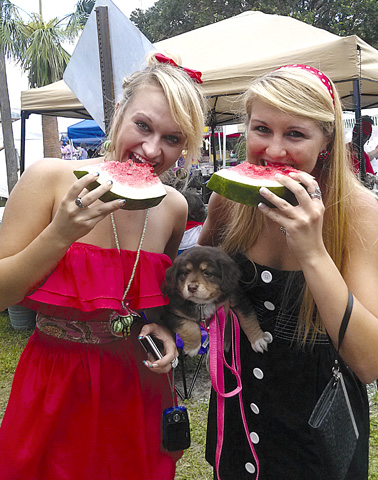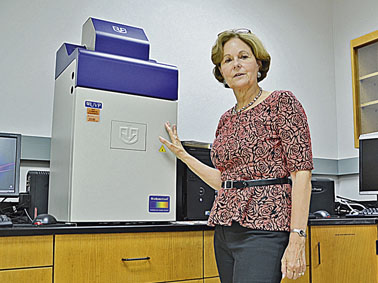
Photo special to Alachua County Today
Two women eating watermelon at last year's festival. The event is one of the longest running festivals in the country.
NEWBERRY – In 1946, the City of Newberry held a watermelon festival to celebrate the end of the Second World War and to embrace the country’s return to prosperity after the Great Depression. There was a plentiful harvest of crops, and the residents of the town thought it was a fitting way to celebrate. That tradition continues today.
“As far as we can tell, it’s one of the longest continual festivals in the country,” said Kathi Lee Thomas, who now serves as the president of the festival after being its secretary since 1993.
The event is ushered in with a parade, followed by an auction and watermelon eating contests.
Residents then go head-to-head, competing to see who has the biggest melon, and the Watermelon Queen is named.
The search for the queen begins weeks before the festival, with a pageant for prospective watermelon royalty. Newberry’s queen takes on the role of an agricultural advocate as she competes at the state level.
Meagan Morgan became Florida’s queen a few weeks ago.
Morgan, born and raised in Chiefland and studying dental hygiene at Santa Fe College, became involved with Newberry during a Teen Queen pageant in 2012.
Her connections helped her prepare for the state watermelon pageant. She will compete in the national campaign in March 2015, after she spends the year promoting Florida watermelon agriculture by attending conventions. She will even be going to markets to help folks pick out the ripest watermelons.
“It should have a mellow, yellow belly, no bruises or scratches,” Morgan said. “Since it’s 92 percent water, it should be pretty heavy.”
She has had a passion for agriculture, and this is her way of becoming involved with Florida’s watermelon industry, one of the top producers in the country.
Morgan works with Florida Watermelon Association and Florida growers as a spokesperson to promote the watermelon market sustained by local agriculture.
“Once watermelon season starts in April, we will go somewhere different every weekend,” she said.
“We even have a convention planned for Canada, which will be pretty exciting.”
Festival day is May 17, at Destiny Community Church off Highway 26 in Newberry. All the proceeds go to the Watermelon Festival of Newberry, Inc. Scholarship Fund. The Florida Watermelon Queen becomes part of a large public relations campaign to promote Florida agriculture once she receives her crown, going to local super markets like Publix and Hitchcock’s to hand out fresh slices of watermelon, as well as going on farm tours, taking pictures with local growers and visiting schools.
# # #
Email cgrinstead@
alachuatoday.com
Add a comment


